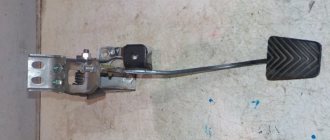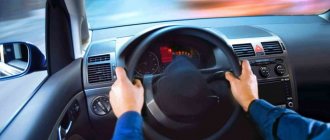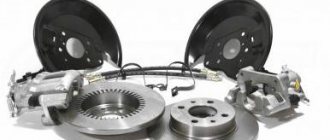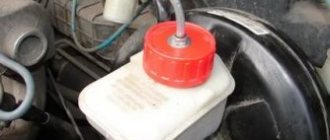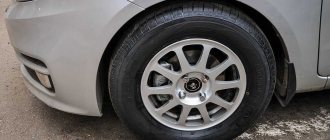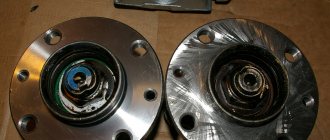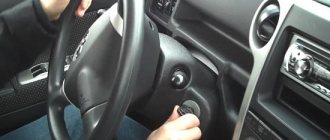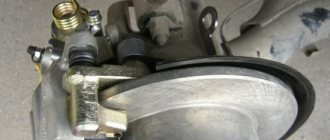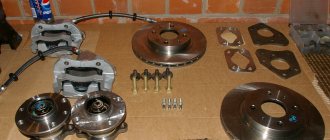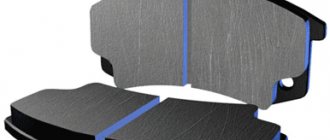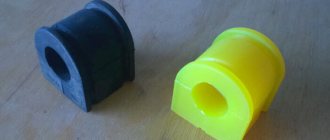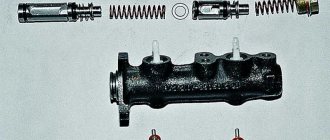There are six main reasons why brake pads squeak . The simplest and most commonplace thing is their wear. However, in addition to this, the cause of squeaking can be brake discs, wheel bearings, incorrectly selected brake pads, dust, dirt, moisture or any small objects getting into the braking system.
As a rule, to eliminate the listed reasons, it is necessary to carry out an audit of the specified components and mechanisms. This can be done yourself, provided that you have experience in performing such repairs and have the appropriate tools. Naturally, eliminating the causes of squeaking brake pads yourself will save you money. However, remember that you must be confident in the final serviceability of the car’s braking system, because it is a critically important component and directly affects the safety of all road users.
Why do brakes squeak? Explanation in simple words
To stop a vehicle, the stationary part of the brake, the brake caliper, also called in foreign style the brake caliper (most often this is the designation for the brake mechanism on motorcycles and bicycles):
with brake pads installed inside it, using pistons, presses the latter against the rotating part of the brake mechanism connected to the wheel - a brake disc or drum:
During braking, the elements of the braking system begin to heat up significantly, expanding unevenly in relation to each other. Despite the fact that the change in the geometry of the technical components is minimal (hundredths or even thousandths of a millimeter), due to the high rotation speed and uneven wear of the brake disc/pad pair, even this is enough to cause unwanted vibration, which is perceived by the human ear as a squeak/squeak .
See also: Squeaking brakes: causes, diagnosis, solutions
This unpleasant high-pitched sound is always heard when friction and sliding of surfaces occurs unevenly, for example, when a brake pad “sticks” to the brake rotor (in the range of milliseconds!) and moves away from it.
Note: constructive measures aimed at preventing whistling
A microscope is not needed to examine engineering tricks. They are of a purely technical nature. We have already talked about one of them - anti-squeak linings on the back of the products. Find out about other means of combating vibration below:
- Bevels and slots on the friction layer move resonant vibrations to higher frequencies.
- The slots perform a role similar to bevels + remove dirt from the contact patch.
- Anti-vibration plates dampen vibrations relative to the piston and caliper bracket.
- Specially curved elements on the back of the pad fit tightly into the working cylinder, which helps to avoid noise in many braking modes.
- Wire brackets dampen vibrations of the friction part along the guide.
- Damping bushings are installed on one of the caliper guide fingers to absorb vibrations.
Brake dust or dirt stuck to the brakes
If brake pads are contaminated with brake dust (fine material that comes from the soles of the pads being worn away) or road dust, they may begin to squeal when decelerating.
This also applies to rust on the brakes - this problem often happens when the car has been sitting for a long time without moving. However, one day is enough when parked in conditions of high humidity. As a rule, in the latter case, the creaking disappears on its own after a dozen or two braking sessions. Rust can be easily removed from brake discs using the same pads. However, it is important to remember that until the discs are free of rust, especially if there is a lot of it, braking performance may be reduced.
Reason five - weather conditions
In the autumn, the cause of sounds that occur when you press the brakes is rain falling on the surface of the pads. In winter, this effect is provoked by condensation that appears as a result of temperature changes. Sharp frosts cause a wet coating that occurs when cold air comes into contact with a heated brake disc. The question arises what to do in this case. It would be a good idea to press the brake pedal several times while moving slowly in order to “dry” the disc.
Errors were made when installing brake system components
This can be observed especially often if only the pads are changed, and not paired with discs. On the one hand, there is nothing wrong with replacing the pads. As you know, discs wear out much, much slower than pads, that’s how they are designed.
See also: How to change the brake pads in your car
However, after installing new pads, you may encounter this unpleasant squeaking sound for a couple of hundred kilometers. Over time the pads will wear in and the sound should go away.
Brakes can also squeak (a very brief squeak, barely perceptible) due to a lack of lubrication on the brake pad guides. This lubricant also helps prevent corrosion at the contact points of the parts.
We also attach an extended list of brake pads
| Manufacturer | Detail number | Part name |
| NIBK | PN3233 | Disc brake pads NIBK, CITROEN, MITSUBISHI, PEUGEOT |
| NIBK | PN0348W | Disc brake pads NIBK, AUDI, SEAT, SKODA, VW |
| NIBK | PN7460 | Disc brake pads NIBK, SUBARU, TOYOTA |
| NIBK | PN8808 | Disc brake pads NIBK, HONDA |
| NIBK | PN3502 | Disc brake pads NIBK, CHRYSLER, MITSUBISHI |
| NIBK | PN2801 | Disc brake pads NIBK, NISSAN |
| NIBK | PN0391 | Disc brake pads NIBK, CHEVROLET, DAIHATSU, HOLDEN, OPEL, VAUXHALL |
| NIBK | PN0436 | Disc brake pads NIBK, HYUNDAI, KIA |
| NIBK | PN0019W | Disc brake pads NIBK, AUDI, CITROEN, FIAT, FORD, LANCIA, MERCEDES, PEUGEOT, RENAULT, SEAT, SKODA, VW |
| NIBK | PN0446 | Disc brake pads NIBK, HYUNDAI, KIA |
| NIBK | PN7501 | Disc brake pads NIBK, SUBARU |
| NIBK | PN8397 | Disc brake pads NIBK, ACURA, BYD, GREAT WALL, HONDA, MG, ROVER, SUZUKI |
| NIBK | PN0349 | Disc brake pads NIBK, AUDI, SEAT, SKODA, VW |
| NIBK | PN0052 | Disc brake pads NIBK, HYUNDAI, KIA |
| NIBK | PN0148W | Disc brake pads NIBK, AUDI, OPEL, SEAT, SKODA, VW |
| FIT | FP1313 | Disc brake pads FIT, HYUNDAI, KIA |
| FIT | DFP1202 | Disc brake pads FIT, HYUNDAI, KIA |
| FIT | FP0929 | Disc brake pads FIT, SUBARU, TOYOTA |
| FIT | FP1210 | Disc brake pads FIT, SUBARU, TOYOTA |
| FIT | FP0768E | Disc brake pads FIT, AUDI, OPEL, SEAT, SKODA, VW |
| FIT | FT0086 | Disc brake pads FIT, CITROEN, MITSUBISHI, PEUGEOT, SUBARU |
| FIT | FP0976 | Disc brake pads FIT, LEXUS, MITSUBISHI, TOYOTA, |
| FIT | FP1467 | Disc brake pads FIT, CHEVROLET, DAIHATSU, HOLDEN, OPEL, VAUXHALL |
| FIT | FP3260E | Disc brake pads FIT, AUDI, CITROEN, FIAT, FORD, LANCIA, MERCEDES, PEUGEOT, RENAULT, SEAT, SKODA, VW |
| FIT | FP0973 | Disc brake pads FIT, CHVROLET, CITROEN, FORD, JAGUAR, MAZDA, OPEL, PEUGEOT, SAAB, VAUXHALL, VOLVO |
| FIT | FP1354 | Disc brake pads FIT, GREAT WALL, LEXUS, SUBARU, TOYOTA |
| FIT | FP0537 | Disc brake pads FIT, ACURA, BYD, GREAT WALL, HONDA, MG, ROVER, SUZUKI |
| FIT | FP1412 | Disc brake pads FIT, HYUNDAI, KIA |
| FIT | FP0905 | Disc brake pads FIT, INFINITI, NISSAN, RENAULT, SUZUKI |
| FIT | FP1616E | Disc brake pads FIT, CITROEN, FIAT, FORD, OPEL, PEUGEOT, PROTON, VAUXHALL |
| FRIXA | FPD17 | Disc brake pads FRIXA, CHEVROLET, OPEL |
| FRIXA | FPE100 | Disc brake pads FRIXA, LADA, RENAULT |
| FRIXA | FPH17R | Disc brake pads FRIXA, HYUNDAI, KIA |
| FRIXA | FPK01NR | Disc brake pads FRIXA, HYUNDAI, KIA |
| FRIXA | FPH20 | Disc brake pads FRIXA, HYUNDAI, KIA |
| FRIXA | FPH26R | Disc brake pads FRIXA, HYUNDAI, KIA |
| FRIXA | FLTH10 | Disc brake pads FRIXA, HYUNDAI |
| FRIXA | FPE102 | Disc brake pads FRIXA, CITROEN, FORD, MAZDA, PEUGEOT |
| FRIXA | FPH02NF | Disc brake pads FRIXA, HYUNDAI, KIA |
| FRIXA | FPE103 | Disc brake pads FRIXA, LADA |
| FRIXA | FPD06 | Disc brake pads FRIXA, CHEVROLET, DAEWOO |
| FRIXA | FLH012 | Disc brake pads FRIXA, HYUNDAI |
| FRIXA | FPD17R | Disc brake pads FRIXA, CHEVROLET, OPEL |
| FRIXA | FPK01N | Disc brake pads FRIXA, HYUNDAI, KIA |
| FRIXA | FPD09 | Disc brake pads FRIXA, CHEVROLET, DAEWOO |
| KASHIYAMA | D3128 | Disc brake pads KASHIYAMA, FORD, MAZDA, VOLVO |
| KASHIYAMA | D3132 | Disc brake pads KASHIYAMA, FORD |
| KASHIYAMA | D2268 | Disc brake pads KASHIYAMA, TOYOTA |
| KASHIYAMA | D2270 | Disc brake pads KASHIYAMA, TOYOTA |
| KASHIYAMA | D2090 | Disc brake pads KASHIYAMA, TOYOTA |
| KASHIYAMA | D6039M | Disc brake pads KASHIYAMA, MITSUBISHI |
| KASHIYAMA | D6106 | Disc brake pads KASHIYAMA, MITSUBISHI |
| KASHIYAMA | D6128M | Disc brake pads KASHIYAMA, MITSUBISHI |
| KASHIYAMA | D2228M | Disc brake pads KASHIYAMA, TOYOTA |
| KASHIYAMA | D2278M | Disc brake pads KASHIYAMA, TOYOTA |
| KASHIYAMA | D2274 | Disc brake pads KASHIYAMA, TOYOTA |
| KASHIYAMA | D2254M | Disc brake pads KASHIYAMA, TOYOTA |
| KASHIYAMA | D2183M | Disc brake pads KASHIYAMA, TOYOTA, GEELY |
| KASHIYAMA | D11268MH | Disc brake pads KASHIYAMA, HYUNDAI |
| KASHIYAMA | D2269 | Disc brake pads KASHIYAMA, TOYOTA |
| MAHLE | 0831301 | Disc brake pads MAHLE, BMW |
| MAHLE | 0331800 | Disc brake pads MAHLE, AUDI |
| MAHLE | 03319N0 | Disc brake pads MAHLE, AUDI, LAMBORGHINI, SEAT, SKODA, VW |
| MAHLE | 03077N0 | Disc brake pads MAHLE, AUDI, SEAT, SKODA, VW |
| MAHLE | 0045902 | Disc brake pads MAHLE, MERCEDES-BENZ |
| MAHLE | 030TC17542000 | Disc brake pads MAHLE, VW |
| MAHLE | TM1397 | Disc brake pads MAHLE, BMW |
| MAHLE | 02202N0 | Disc brake pads MAHLE, DACIA, NISSAN, RENAULT |
| MAHLE | 0332000 | Disc brake pads MAHLE, AUDI, SEAT, SKODA, VW |
| MAHLE | 0332001 | Disc brake pads MAHLE, AUDI, SEAT, SKODA, VW |
| MAHLE | 08320N0 | Disc brake pads MAHLE, BMW |
| MAHLE | DTM1105 | Disc brake pads MAHLE, AUDI, SEAT, SKODA, VW |
| MAHLE | 01568N0 | Disc brake pads MAHLE, FORD |
| MAHLE | TI16105 | Disc brake pads MAHLE, AUDI, SEAT, SKODA, VW |
| MAHLE | 03301N0 | Disc brake pads MAHLE, AUDI, SEAT, SKODA, VW |
| MAHLE | 0307102 | Disc brake pads MAHLE, SKODA, VW |
| MAHLE | D03048N0 | Disc brake pads MAHLE, VW |
| MAHLE | 0332002 | Disc brake pads MAHLE, AUDI, VW |
| MAHLE | 01221N0 | Disc brake pads MAHLE, OPEL, VAUXHALL |
| MAHLE | 03090N0 | Disc brake pads MAHLE, AUDI, MITSUBISHI, SEAT, SKODA, VW |
Use of non-original/low-quality parts
Any car owner who uses non-original parts when servicing brakes for reasons of economy and buys them from a third-party supplier sometimes faces the problem that the parts do not fit together one hundred percent. A small gap remains, or, conversely, the same pads have to be almost driven into the seats. All this gives additional discrepancy between the parts.
Plus, low-quality pads (more often), discs (less often) can be made of cheap materials interspersed with solid particles, which will certainly start squeaking at the first opportunity. Therefore, car brakes are not the place where you can save money.
See also: How to determine when to change pads?
Bottom line: if the squeaking noise does not disappear after a short time, it is probably due to the quality of the parts that do not fit together perfectly.
Braked too much
If the brake system has been overheated due to excessive braking (emergency situation) or too long braking (downhill, serpentine), it is possible that the brake discs (disc) have become deformed or both discs and pads have become deformed. Also, do not forget that excessive heat generation literally hardens the metal surface, reducing friction between the pads and the disc. In this case, what is much worse than the squeaking noise is that the braking power will be sharply reduced.
Let the new brakes get used to each other.
New brake pads and rotors should not be overloaded during the first few hundred kilometers. In this way, both parts of the braking system can adapt to each other.
If you immediately switch to intensive operating mode (high speeds, strong braking), this style can lead to varying wear of the friction surfaces and constant squealing. Nevertheless, of course, it is better, even with new brakes, in a critical situation to press the brake pedal as much as possible. It’s better to let the brakes squeak than to provoke an accident.
The grinding noise constantly intensifies and is quite sharp.
One of the most common situations in which you will need to use the help of specialists at a service station is an increase in grinding or a sharp, strong sound of metal rubbing against metal. Most likely, the block is completely worn out; you continue to brake with the sole of the block, which is made of hard metal. If this problem is not addressed promptly, the brake disc may fail and require replacement. In this case, repairs will be three times more expensive, so it is better to immediately identify all possible malfunctions and problems that caused the grinding noise. In particular, to diagnose this problem, it is enough to carry out the following processes:
- determine from which side the grinding sound is heard, this will help you halve the amount of work required for diagnosis;
- remove the wheel that you suspect is making unpleasant sounds when braking;
- examine the exposed brake disc for grooves, chips and other problems with the working surface;
- look at the remaining layer of the brake pads, determine the degree of wear and the need for replacement;
- also examine the second wheel on this side, and best of all, examine the braking system on all wheels;
- Identify possible problems that could lead to squeaking and consult with specialists.
This will often help you determine the cause of the squealing noise when braking for free, but disassembling the brake system and performing repair work yourself is not always wise. You can use the services of specialists and guarantee the normal operation of the brake system. However, it is quite possible that all braking systems visually appear to be in good working order, but the grinding noise is still present. Then see if the car's behavior has changed during braking. If there are changes, you will have to pay more attention to this problem. If there are no changes, you can continue to operate the car until the grinding noise intensifies and gives specific clues.
When should you go to the workshop because of a squeak?
Squeaking noise when braking can have different causes. As a rule, there is no danger from it. This is not a sign of serious brake failure. It is, of course, unpleasant, but it will not harm your health or the life and health of others.
But there is one “but”! If the squeak is accompanied by a loss of braking power, this means: immediately take it to the workshop! Perhaps even on a tow truck.
See also: How to understand what is noisy in a car
If the cause of this behavior of the car is dirt or rust on the brakes, this ailment can usually be eliminated by applying careful braking - the squeaking will stop and braking will improve. However, if mistakes were made during installation or low-quality parts were used, the squeak will remain. If the brakes were overheated, the squeaking will also not go away. In this case, an experienced technician will help and replace components. Again, your path lies to the workshop.
How to deal with grinding?
If you hear a grinding noise on the front wheels when braking, the easiest way is to replace the pads with original ones. Such a solution cannot be called economical, especially when the parts are completely new. In addition, there is no guarantee that the method will work. First advice: do not rush to buy spare parts; first you should take a number of actions:
- Check the mechanisms for leakage of brake fluid and oil in the rear wheels. If a leak is detected, repairs must be made and the rubbing parts must be thoroughly cleaned.
- Try running in newly updated pads by performing a few hard braking sessions.
- Carry out diagnostics of the chassis and the performance of the brake mechanisms. Loose guides, calipers and wheel bearings should be replaced.
Note. Sometimes simple washing and cleaning of work surfaces helps get rid of squeaking. Dirt and sand falling between them can cause a whistle and definitely provoke accelerated wear of the contacting planes.
What should a car enthusiast do when the above measures do not produce results:
- pads worn to the limit - definitely replace them;
- try to cut grooves on the working part yourself, dividing it into 2 sectors;
- carefully file the surfaces along the edges to reduce the contact area;
- If the squeak does not disappear after replacing the pads, you will have to grind the discs.
